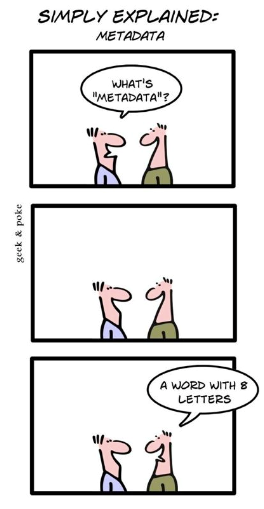Your Successful Metadata Journey Begins Here!
June 17, 2025

Metadata: Unveiling the Hidden Context of Information
In today's hyper-connected digital world, data is generated at an unprecedented pace. Whether you're managing documents, multimedia content, or massive datasets, there's one often-overlooked element working behind the scenes that makes it all manageable: metadata.
At Informed Byte, we believe that understanding metadata isn't just for technologists—it's for anyone looking to harness the full power of information. Whether you're leading digital transformation or simply striving for more effective information management, your successful metadata journey starts right here.
What Is Metadata, Really?
Put simply, metadata is data about data. But don't let that definition fool you—its implications are far-reaching. Metadata provides the vital context that gives raw information its meaning. Think of it like the packaging on a product: you might not see it when you're consuming the content, but it guides how you find, interpret, and use what's inside.
For example, the metadata of a photo might include the date it was taken, the camera used, the geolocation, and even the photographer's name. For a document, it could include the author, version history, and access permissions. These small details can make or break your ability to discover, organise, protect, and utilize information effectively.
The Many Faces of Metadata
Metadata isn't one-size-fits-all. It comes in various types, each serving a specific role in how information is structured and managed:
Descriptive Metadata: This is what helps you find and identify content—titles, keywords, summaries, and categories. It's the fuel behind search engines, catalogs, and filters.
Administrative Metadata: Focused on governance, this metadata manages how information is handled—who owns it, who can access it, and for how long. It's critical for compliance, security, and lifecycle management.
Structural Metadata: This metadata outlines how data is organised. In a video file, for instance, it might describe scene sequencing or timing. It helps machines and users navigate complex formats.
Technical Metadata: Think resolution, encoding, file size, and format. Technical metadata ensures that systems interpret data correctly and optimally.
Statistical Metadata: Found in research and analytics, this provides insights into the quality and origin of data—such as methodology, data collection techniques, and accuracy assessments.
Preservation Metadata: This supports long-term digital archiving. It tracks data migrations, file integrity, and the steps taken to ensure continued accessibility over time.
Why Metadata Matters
We live in an age where information is both abundant and essential. Metadata is the key to unlocking that information effectively. Here's why it's indispensable:
Enables Smart Discovery: With robust metadata, users can quickly locate the right data among millions of files, boosting efficiency and productivity.
Provides Critical Context: Metadata tells the story behind the data—who created it, when, why, and how. That context helps us evaluate trustworthiness and relevance.
Supports Integration Across Systems: In a world of siloed systems, metadata acts as a common language, helping organisations merge and analyse data holistically.
Drives Compliance and Governance: Regulatory requirements increasingly demand proof of data lineage, ownership, and control. Metadata provides the audit trail.
Improves Data Quality: Metadata helps flag outdated, inaccurate, or duplicate content—keeping information ecosystems clean and reliable.
Ensures Longevity of Digital Assets: As technologies evolve, metadata ensures that valuable digital content remains usable and meaningful decades from now.
Real-World Applications of Metadata
Metadata isn't abstract—it's actively shaping the way we engage with information across industries:
Digital Libraries & Archives: Libraries rely on metadata to catalog and retrieve books, research papers, and historical documents.
Search Engines & Content Platforms: Every keyword search you perform is powered by metadata that ranks and categorizes results.
E-Commerce & Retail: Online shoppers filter by size, color, rating, or availability—all thanks to structured product metadata.
Media Management: Photographers and videographers use metadata to organise and tag creative assets across huge media libraries.
Scientific Research: Repositories use metadata to ensure datasets are discoverable, citable, and properly attributed.
Geospatial Intelligence: GIS platforms use metadata to describe maps, satellite imagery, and spatial relationships for decision-making in fields like urban planning and agriculture.
Challenges You Shouldn't Ignore
Despite its many benefits, metadata comes with challenges that require strategic attention:
Accuracy & Integrity: Inaccurate metadata leads to poor decisions. Ensuring quality metadata—especially at scale—is a continuous effort.
Standardisation Across Systems: Different industries and platforms use different metadata standards, creating friction during data exchange.
Ongoing Maintenance: Metadata must evolve with the data it describes. Without updates, metadata becomes stale and unreliable.
Privacy Risks: Metadata can contain personal or sensitive information. Proper handling and anonymisation are essential to maintain trust and legal compliance.
Too Much of a Good Thing: Metadata overload can be just as harmful as having none at all. Striking the right balance is key.
Automation Limitations: Extracting accurate metadata from unstructured data (like audio or handwritten notes) remains an evolving challenge, though advancements in AI are making strides.
Why We Love Metadata (And You Should Too)
At Informed Byte, we see metadata not just as a technical tool, but as a strategic asset. It quietly powers everything from digital preservation and efficient workflows to personalised user experiences and regulatory compliance.
In short, metadata is the invisible infrastructure of the digital age—a framework that brings order, insight, and longevity to the data that drives our world.
So, whether you're just beginning your metadata journey or refining a mature data strategy, remember: the key to informed decision-making starts with informed metadata.
Begin the journey
